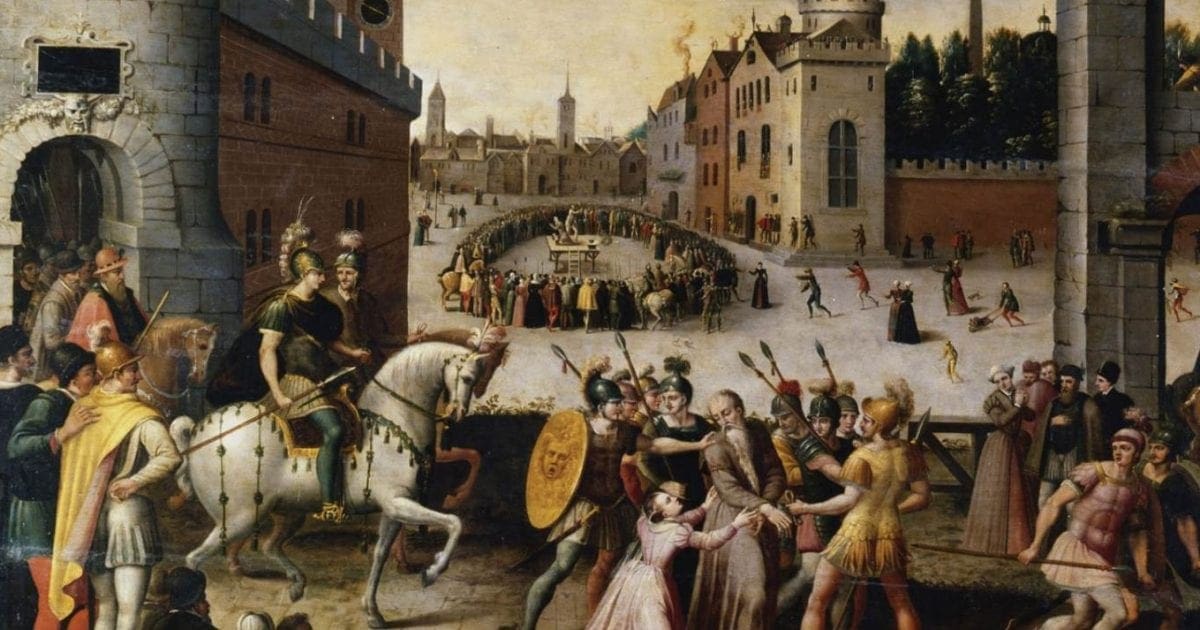“It is no exaggeration to say that on Sundays in Washington during the administrations of Thomas Jefferson (1801-1809) and of James Madison (1809-1817) the state became the church.” – Library of Congress
“Religion in America takes no direct part in the government of society, but it must be regarded as the foremost of the political institutions of that country…” –Alexis de Tocqueville, Democracy in America
It is quite unfathomable that the founding fathers’ intent has been somehow interpreted over time to mean that all semblance of religion should be removed from the public square. That interpretation, one could reasonably conclude, would lead to suppression of religion, or “prohibiting the free exercise” of religion.
Would the founders approve of the deep anti-Christian sentiment found in America today? It seems that smothering Christianity and bashing the “religious right” would have been deeply offensive to the founding fathers, and indeed, reminiscent of the religious persecution from which their ancestors fled.
The founding fathers believed in religious freedom, not religious suppression and persecution. Even the Library of Congress confirms that “the great majority left Europe [to come to America] to worship God in the way they believed to be correct.” In Europe, “majority religious groups who controlled political power punished dissenters in their midst.” The “New England colonies, New Jersey, Pennsylvania, and Maryland,” the article continued, “were conceived and established as ‘plantations of religion.’”
While most of the founding fathers were undeniably deeply religious, they also wanted to ensure that the federal government would impose “no law respecting an establishment of religion, or prohibiting the free exercise thereof.”

The Leftist Lie about the ‘Wall of Separation‘
In 2012, Jim Wallis, President Obama’s “spiritual adviser,” said, “It’s not a Christian nation. It’s never been a Christian nation…we set this up so that it would not be a Christian nation for any religious framework.” [emphasis added] Wallis goes to the extreme, ignoring that America was indeed founded with religious – and yes, biblical – principles in mind. Wallis also referred to the Tea Party as “unbiblical,” but that is another story.
Watch:
From the Declaration of Independence:
“We hold these truths to be self-evident, that all men are created equal, that they are endowed by their Creator with certain unalienable Rights, that among these are Life, Liberty and the pursuit of Happiness…”
Addicting Info posted a list of 35 quotes “conservative Christians will hate,” which put forward the idea that the government has no business dictating how people should practice their faith. The quotes that were chosen do not confirm a disdain for religion, but a disdain for corruption and religious persecution.
The first quote highlighted at Addicting Info was from George Washington, in a letter to the United Baptist Chamber of Virginia, May 1789:
“If I could conceive that the general government might ever be so administered as to render the liberty of conscience insecure, I beg you will be persuaded, that no one would be more zealous than myself to establish effectual barriers against the horrors of spiritual tyranny, and every species of religious persecution.”
It is doubtful that any “conservative Christian” would disagree. The founders did not want to suppress religious sentiment; they wanted to avoid further religious persecution.
The entire quote:
“If I could have entertained the slightest apprehension that the Constitution framed in the Convention, where I had the honor to preside, might possibly endanger the religious rights of any ecclesiastical society, certainly I would never have placed my signature to it; and if I could now conceive that the general government might ever be so administered as to render the liberty of conscience insecure, I beg you will be persuaded that no one would be more zealous than myself to establish effectual barriers against the horrors of spiritual tyranny, and every species of religious persecution. For you, doubtless, remember that I have often expressed my sentiment, that every man, conducting himself as a good citizen, and being accountable to God alone for his religious opinions, ought to be protected in worshipping the Deity according to the dictates of his own conscience.” [emphasis added]
Thanks to the dedicated efforts of the anti-federalists, America’s Bill of Rights was incorporated into the Constitution. The Bill of Rights consists of the first ten Amendments.
The First Amendment to the Constitution is to the point, the part that deals with religion is known as the “establishment clause.”
“Congress shall make no law respecting an establishment of religion, or prohibiting the free exercise thereof; or abridging the freedom of speech, or of the press; or the right of the people peaceably to assemble, and to petition the Government for a redress of grievances.”
The federal government “shall not” choose one religion over another. In fact, Thomas Jefferson’s phrase, “separation of church and state” was addressing that very issue in Connecticut. Literally two days after the letter to the Baptists was written, Jefferson began attending church services in the House of Representatives. If Thomas Jefferson meant that literally there should be no semblance of religion on government property, why did he attend religious services in the executive branch buildings from 1801 to 1809?
Jefferson’s letter to the Danbury Baptists ended with a prayer:
“I reciprocate your kind prayers for the protection & blessing of the common father and creator of man, and tender you for yourselves & your religious association, assurances of my high respect & esteem.”
The phrase “separation of church and state” does not mean that public buildings are forbidden to display the Ten Commandments, that prayer should be banished from public schools or that a memorial in the shape of a “cross” should be removed from public property.
It means that Congress should “make no law” to designate a state religion, which can lead to religious persecution, which forced “most” to leave Europe for America. It means that Americans are free to practice their religion as they see fit.
The phrase “separation of church and state” is not in the Constitution or any other founding document. It was a phrase in a letter that has been taken out of context and used for political purposes. After the phrase “Separation of Church and State” lay dormant for decades upon decades, it was progressively repackaged by a member of the Ku Klux Klan, Supreme Court Justice Hugo Black.
Many of America’s founding fathers were deeply religious. There is no denying that America’s founding documents reflected their faith in God and the founding fathers believed that morality, rooted in religion, was necessary for America to thrive. So if Americans are use the “separation of church and state,” (out of context, as it were) as grounds for shoddy Supreme Court decisions, Americans must then be able to use all of the words written by the founders to justify all sorts of legal decisions.
The truth is that the establishment clause should be enough. The government has no business telling Americans how to worship. Arguably, the governments meddling in marriage and birth control among other things, is unconstitutional. Also, in this author’s opinion, tax-exempt status for churches is unconstitutional. Governments should not have undue influence on teachings of the church.
America was founded as a Religious nation
In his Farewell Address of September 1796, George Washington declared, “[O]f all the dispositions and habits which lead to political prosperity, religion and morality are indispensable supports.”
Furthermore, he said,
“Let it simply be asked: Where is the security for property, for reputation, for life, if the sense of religious obligation desert the oaths which are the instruments of investigation in courts of justice? And let us with caution indulge the supposition that morality can be maintained without religion. Whatever may be conceded to the influence of refined education on minds of peculiar structure, reason and experience both forbid us to expect that national morality can prevail in exclusion of religious principle.”
John Adams wrote in 1776 that statesmen “may plan and speculate for Liberty, but it is Religion and Morality alone, which can establish the Principles upon which Freedom can securely stand.”
He continued:
“The only foundation of a free constitution is pure virtue; and if this cannot be inspired into our people in a greater measure than they have it now, they may change their rulers and the forms of government, but they will not obtain a lasting liberty. They will only exchange tyrants and tyrannies. You cannot, therefore, be more pleasantly or usefully employed than in the way of your profession, pulling down the strong-holds of Satan.”
In 1798, John Adams wrote, “Our Constitution was made only for a moral and religious people. It is wholly inadequate to the government of any other.”
In 1803, Thomas Jefferson wrote:
“To the corruptions of Christianity I am indeed opposed; but not to the genuine precepts of Jesus himself. I am a Christian, in the only sense he wished any one to be; sincerely attached to his doctrines, in preference to all others; ascribing to himself every human excellence; & believing he never claimed any other.”
It is doubtful that the founding fathers would agree that people should be forced to pay, through taxes, for things that go against their religious beliefs. Thomas Jefferson also wrote that “to compel a man to furnish contributions of money for the propagation of opinions which he disbelieves and abhors, is sinful and tyrannical.”
WallBuilders has a comprehensive list of more quotes on religion by America’s founding fathers.
*Featured Photo: “The Arrest and Execution of Sir Thomas More in 1535”
*Reprinted with edits with permission from TrevorLoudon.com.














Add comment